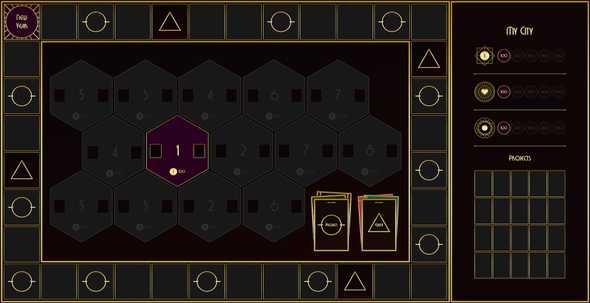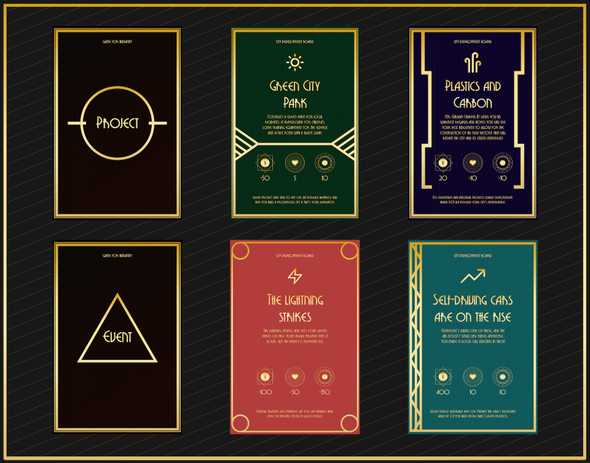For the first part of this entry, please proceed to Version Control
Project discovery
Earlier this sprint, I kicked off the process by ideating the product that would help increase environmental awareness.
I came up with an idea of a board game — tentatively titled ‘Game for Humanity’ — the goal of which would be to run the city, expand its limits, and help it prosper while striking a good balance between green and traditional economy.
Delivery
Working out the game’s mechanics
I started working on the final prototype in a spreadsheet: apparently, the most common practice in board game development, as per many forums I have visited prior. It took a while to put together the necessary formulas and make sure the mechanics work just as expected — every card draw and year passing should have short- and long-term effects on the player and their city.
Having the mechanics in place, it was only a matter of crafting the high-fidelity prototype.
Final version
The final version, designed in Figma for a faster turnover and a more coherent result, features a board, as shown below, and a set of cards.
As the player makes a move, they draw a card from the deck and choose whether to purchase or decline the project, suffer the consequnces of an accident, or get rewarded.
The concept is very basic: I decided to spend a bit more time playing with the visual aspect and make the cards look impressive (and fit the selected style).
Reflection
At the end of any Rapid Ideation session, this and the previous one are no exceptions, I love to look back at the progress and think about the things that went well, things that I could have done differently, and things that didn’t go as planned.
What went well
Overall, I am relatively happy with the outcome of this session, despite it going much less smooth than the previous rapid ideation.
I really enjoyed putting together my first-ever board game concept — it always looked much simpler on paper, but in practices, a somewhat complex game will takes months of hard work to deliver a comprehensive and fun product with well-balanced mechanics.
Using FOSS for the majority of my runway, except the final delivery, was rather interesting and fascinating. Some software products are, unfortunately, far from delivering a pleasant experience (PenPot felt raw and buggy), while the others will definitely remain in my toolbox for the upcoming projects (Raindrop is absolutely amazing, and so is Excalidraw).
I managed to learn a lot about board games in a short period of time, tried some out myself — from ‘Exploding Kittens’ to ‘Terraforming Mars’. I used to be a firm believed that board games in general were either too childish, too complex (D&D), or intentionally simple and fun (Cards Against Humanity) — I couldn’t think there would be so many games that would serve as a great educational material in the market. I assume that is in like with how Fook and Gardner (2007) explain critical reflection from the post-modernistic perspective: challenging the existing assumptions, the perception of power, education, knowledge.
What went wrong
From the get-go, my idea seemed a bit too ambitious for a short rapid ideation project, and I decided to tackle too many things: from it being educational and fun to delivering a rather complex mechanics of the game itself.
In a way, I failed to deliver on both: the game turned out to be rather basic, despite plenty of time spent on discovery and research, and it didn’t turn out to be as complex as I hoped it would be. I cannot say I am not satisfied with the result, but I definitely could have simplified the initial concept, sacrificing some unnecessarily bloated ideas.
I also missed the opportunity to pick up another skill — for instance, 3D or graphic design. For the next sessions, I should be more clear with the goals I have in mind, including the skills I am willing to develop by the end of the session.
What could have been improved
For this particular session, I didn’t have a need to use version control tools — however, for the next session, I should set up a Bitbucket or a GitLab account (in accordance with my promise to not use familiar software for rapid ideation sessions), and make sure I track the changes accordingly.
I didn’t quite stick to the FOSS until the very end, and I did run all the programmes in a proprietary OS — next time, I could this opportunity to get myself familiar with a different OS (ex-Ubuntu myself).
References
FOOK, Jan and Fiona GARDNER. 2007. EBOOK: Practising Critical Reflection: A Resource Handbook. Buckingham, UNITED KINGDOM: McGraw-Hill Education. Available at: http://ebookcentral.proquest.com/lib/falmouth-ebooks/detail.action?docID=332676 [accessed 22 Sep 2021].

